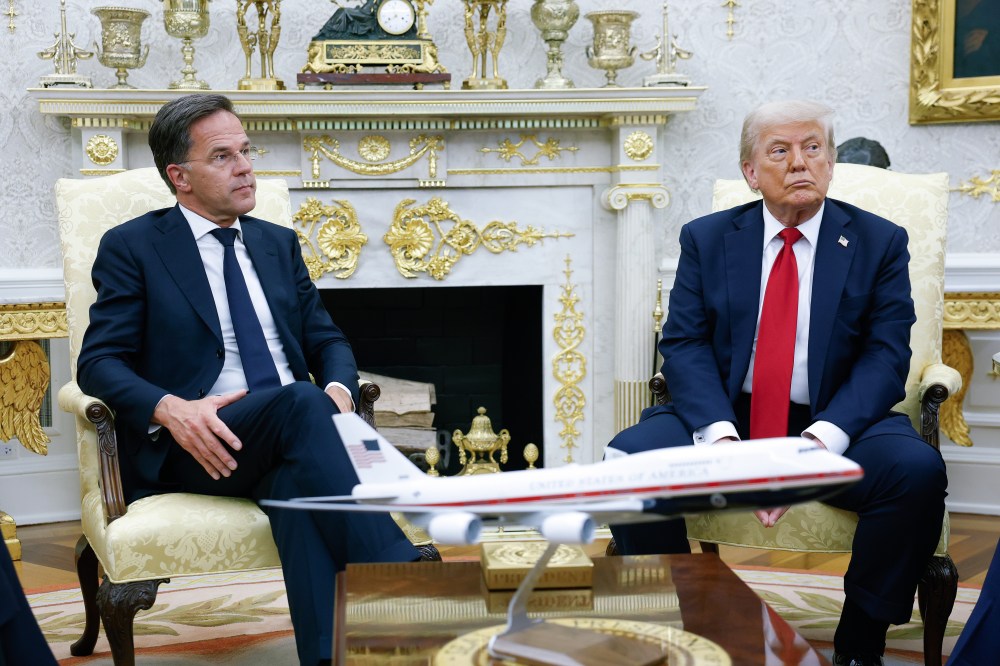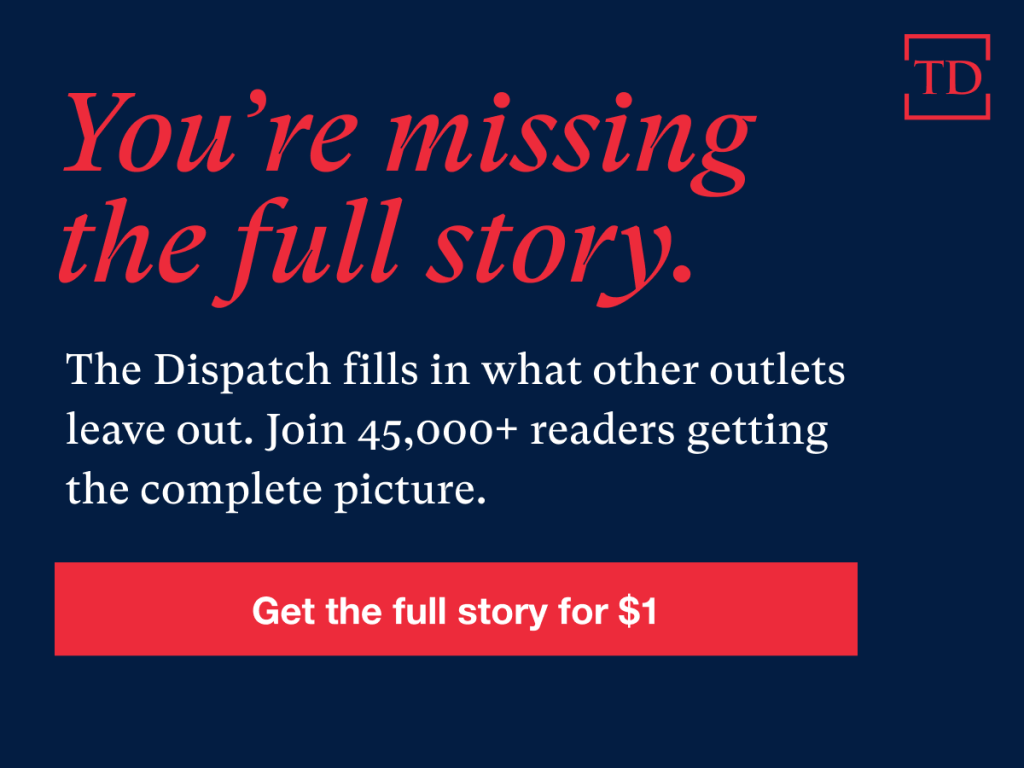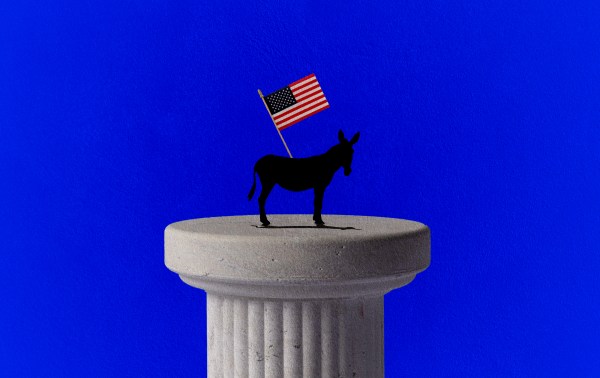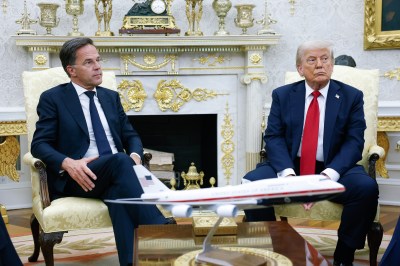President Donald Trump has a couple of problems when it comes to being an effective executive, the top two being: 1) He is an ignoramus and 2) He insists on surrounding himself with yes-men who are too afraid to tell him that he is an ignoramus.
Take the matter of tariffs and sanctions, which, in the matter of the Trump administration’s vague and confused policy toward Russia, the president continues to conflate.
Economic sanctions are nonmilitary means to bring an adversary to heel. A tariff is a sales tax. A tariff can be used as a kind of sanction, but it usually isn’t a particularly effective one, especially in relationships such as the U.S.-Russia relationship, in which there is almost no trade to tax. But Trump is a simpleton who can keep only one idea in his head at a time, tariffs are at the moment that one idea, and so this outmoded sales tax remains his current obsession.
As many critics, myself included, have pointed out for some time now, the Trump administration has two obviously incompatible goals when it comes to tariffs: generating revenue and protecting certain politically favored domestic businesses from competition. The more you do of one, the less you are doing of the other: If there is a lot of tariff revenue being generated, that means that the imports are still in high demand in the U.S. market, so domestic competitors are not being very effectively shielded; if tariffs are raised to the point that they choke off demand for the targeted imports, then there will be little or no revenue, because there’s nobody paying tariffs on imports that are kept out of the market.
As a non-paying reader, you are receiving a truncated version of Wanderland. You can read Kevin's full newsletter by becoming a member here.
In that sense, tariffs are like “sin taxes,” excises applied to products such as alcohol, tobacco, and gambling establishments, which are thought to be socially undesirable in and of themselves, or at least to come with serious externalities. If a sin tax is generating a lot of revenue, it isn’t working to prevent consumption of the targeted goods; if a sin tax is working to prevent consumption of the targeted goods (by making them unattractively expensive) then it isn’t going to generate very much revenue, because there is no sales tax on sales that do not happen.
Allow me to go a little bit afield here.
A sin tax is a kind of “Pigouvian” tax, meaning a tax that is designed to address externalities, which are costs that are imposed by consumption of a certain good and that fall on neither the buyer nor the seller but on some third party, including on the community at large. (There are positive externalities as well, but that is beyond our scope here.) Pigouvian excises include such charges as gasoline taxes meant to offset the cost of pollution associated with gasoline use, or carbon taxes meant to shift the costs of climate change onto consumers and producers of goods associated with the production of greenhouse gases. There is a rigorous version of the Pigouvian tax model (an ideal Pigouvian tax produces a Nash equilibrium and Pareto efficiency, which, grossly simplified, means having reached a state in which there is no way to make anybody better off without making someone else worse off) but in the real world it is mostly a by-the-seat-of-their-pants kind of thing: As with Trump and the new tariff rates he announces every 20 minutes, it is a product not of economic calculation but of politicians simply doing whatever feels about right to them in the moment.
You can fund a government by means of Pigouvian taxes, if you like. For example, the libertarian in me sometimes wants to call the climate alarmists on their bluff and propose funding the entire federal government exclusively through a single carbon tax. For the people who care (or who say they care) about climate change above all other things, that would have the benefit of shifting direct costs onto what they see as an undesirable kind of consumption, creating incentives for shifting to lower-carbon energy sources and for seeking efficiencies in energy use overall, which would not be terrible outcomes.
Such a tax would also (in the hypothetical ideal form) simplify the tax code, create a very large and stable tax base in which costs would be spread out in such a way as to make gaming the system prohibitively expensive, reduce economic distortion (meaning the diversion of resources away from their most productive purposes as a matter of tax strategy) relative to the current tax code, etc. It might function as a kind of de facto subsidy for solar power and wind, but it also would improve on explicit subsidies by helping to ensure that the solar and wind markets would bear the costs associated with the not-so-bucolic industrial ecosystem that makes solar and wind power possible, which includes a lot of petroleum (used in everything from the installation of wind turbines to the production of polymers for solar panels) as well as heavy industrial activities such as mining and producing steel and aluminum. A tax on carbon is a tax on energy, food, and transportation, which has a virtue in common with Henry George’s famous proposal for a single tax on the value of unimproved land: Practically speaking, there is no way to avoid it, with costs being widely distributed, directly and indirectly, throughout a great variety of goods and services, while most of the economic distortions associated with it would take the form of incentives encouraging investments and changes in consumer behavior that many of us would think of as desirable.
It would not scratch every social-justice itch, of course (a feature, not a bug) in that a quantity of carbon dioxide emitted by a hybrid truck transporting organic produce to a charity serving poor refugees would be taxed at the same rate as an identical quantity of carbon dioxide produced by Jeff Bezos’ yacht. But it would be progressive in the sense that rich people consume a lot more energy per capita than poor people do—that is part of what it means to be rich, and the difference gets more extreme the higher up the distribution you go: Reasonably well-off people take more international flights than poor people, first-class is more energy-intensive than coach, flying private produces a hell of a lot more greenhouse-gas emissions than flying commercial, etc.
To take it back to our original subject: The trade-offs associated with tariffs, which are just taxes on imports, are a lot less attractive. They produce lots of economic distortion and come with high compliance costs. Americans and the world at large have a lot of experience with tariffs, and experience has shown that they are neither particularly powerful as sanctions nor particularly useful as taxes.
You could fund the entire U.S. government through tariffs, if you wanted (doing so was a lot easier back in the early 19th century, when the federal government was very, very small relative to the stately Leviathan of 2025), but you’d have a lot of intractable problems. For example, there are things Americans want and need that simply are not produced in the United States, many of which cannot be produced in the United States efficiently and some of which could not be produced in the United States at all. Notionally, the tariff in 2024 would have had to be about 175 percent to fund all federal spending (about $7 trillion in revenue generated from about $4 trillion in imports) though, in the real world, a tariff that high would greatly discourage the consumption of imports, encouraging the substitution of domestic alternatives, etc.—meaning you’d need an even higher tariff on the smaller quantity of imports, creating even more powerful disincentives, on and on down a vast rabbit hole of economic asininity. And when some defense contractor needs billions of dollars’ worth of rare-earth minerals to produce some armament, are we going to tax that firm’s imported inputs at 422 percent or whatever, only to turn around and pay for those goods out of the 422 percent or whatever we’re charging on banana imports?
History suggests that what you’d end up with is a bunch of special carve-outs and exemptions for favored goods and favored industries. (To be fair, history suggests much the same about my hypothetical carbon tax; I am trying to avoid the rhetorical gambit of “The ideal version of my policy is preferable to the non-ideal version of your policy.” But stick with me.) Businesses have a way of getting what they want. Think of this: The Trump administration, and the president personally, cares more about the issue of illegal immigration than almost anything else, and yet the president was an absolute pushover when the farmers and the hoteliers came around complaining about higher labor costs resulting from an immigration crackdown. (Trump being Trump, there has been much gutless vacillation; but the inclination to cave and to accommodate was the top-line impulse.) Trump’s first instinct with tariffs, similarly, was to exempt inputs desired by politically powerful businesses such as automakers. It is easy to imagine some progressive populist in a few years petitioning a Democratic government for exemptions for solar-panel inputs or organic baby formula or Birkenstocks or yoga mats or whatever. If you wanted to make an argument for special carve-outs for Bordeaux wines or really good socks made in England or BMW motorcycles (even though papa isn’t allowed to have one anymore), then President Williamson probably would give you a hearing.
For Trump, of course, tariffs are not mainly a tax issue at all: They are, in his mind, an instrument of coercion. He routinely conflates tariffs with sanctions, recently with regard to his administration’s Russia policy, which has been all over the map upon which the president himself probably could not point to Kyiv. But the economic sanctions the United States applies to Russia are not in the main tariffs at all but things such as freezing assets, excluding Russia from the international-payments system, imposing export controls on certain sensitive goods to keep them from being re-exported to Russia by U.S. trading partners, targeting individual oligarchs, etc. Trump talked idly about imposing a tariff of around 100 percent on Russian goods if Putin won’t play ball on Ukraine, apparently without giving any thought to the fact that thanks to his administration’s own sanctions policy, there is practically no trade between the United States and Russia and, hence, no Russian imports to which a tariff might be applied. Russian exports to the United States today amount to about 0.2 percent of Russian GDP, with fertilizer being the most economically consequential Russia-sourced good in the United States. Trying to pressure Moscow with tariffs on Russian exports to the United States would be like trying to pressure Goldman Sachs by raising the payroll tax on a single partner at the firm.
The Russian case is relatively straightforward: Moscow is a dangerous aggressor that needs to be kept in a very small box; the United States has very little to lose from applying economic sanctions to the Russian economy but in fact (if you want to be an amoral Machiavellian about it, which I kinda-sorta do) stands to gain in that Russia’s most globally significant economic activity puts it in direct competition with the U.S. energy industry; secondary sanctions, meaning sanctions applied to third parties that do business with Russian in spite of U.S. sanctions, entail more risk and more costs for the United States, but these are manageable and worth bearing.
Indeed, the Trump administration remains, if anything, far too soft on Russia: Our president, allegedly a master negotiator, opened by conceding a great deal to Putin in exchange for precisely nothing; rather than such appeasement, a better strategy would be to impose heavier, even more punitive sanctions with very robust secondary sanctions and asset seizure, and to do so on an open-ended basis rather than offering Moscow a definite checklist for securing future relief. Rather than offering Putin a way out, offer him pain and let him make an offer of his own when he has had enough. Our policy should be to reduce the Russian economy to rubble and then make the rubble bounce. You don’t get that done with a sales tax on Indian exports to the United States—you get that done by seizing the assets of the executives of Indian refiners importing Russian crude oil, by excluding them from banking and other financial services, by categorically prohibiting their goods from your markets, by blocking their access to necessary goods and technology, etc. The Europeans have done a little bit in that direction, but both the Europeans and the U.S. government have been far too timid in this matter. What is at stake in Ukraine is not only Ukrainian interests but, much more to the point in Washington, American interests. Securing these interests is what power is for.
Much more challenging is the case of China, with which the United States has a complex, mutually beneficial economic relationship, and which is not currently involved in an ugly and explicit war of national extermination with a neighboring country. Tariffs on Chinese goods will prove costly in the way any cumbrous and badly designed tax is costly, and more robust economic sanctions would be even more costly.
That would be a high price to pay for ... well, what, exactly?
The United States cannot quite decide what it really wants from the U.S.-Chinese relationship—we talk about China as though it were a belligerent power in a state of near-war or pre-war with the United States, but we remain very, very vague on what it is we want Beijing to do as a geopolitical matter. Donald Trump, like Joe Biden before him, has talked about China mainly as a competitor in manufacturing and other politically sensitive economic activities. That may be economically costly, but it isn’t Pearl Harbor. Do we want China to give up its claim to Taiwan, or do we want China to stop making opportunistic investments in Africa and Latin America? Do we actually care all that much about the Uyghurs, or is that at least in part pretextual? When the last “Free Tibet!” bumper sticker has peeled away from the immobile carcass of the last Saab 900, what will we demand of Beijing? I sometimes think that Washington cannot quite say what it wants from Beijing because it is embarrassed by what it actually wants: for China to cease becoming wealthier and more powerful and, by dint of its doing so, increasing its footprint in Asia, in the Pacific, and beyond. It isn’t that the rotten little junta in Beijing isn’t despicable—it is that and worse—but what the United States actually wants remains, in many aspects, poorly defined.
It is a diplomatic truism that weakness is provocative. In the long-term, muddleheadedness is even more expensive and even more dangerous. We can be sure that the elderly tyrants in Beijing are watching the Trump administration’s desultory and—let us admit it—incompetent engagement in the Russia-Ukraine war. They may not be laughing at us—the president seems to fear being laughed at above all—but be sure that they are taking notes.
Words About Words
About that dopey Donald Trump letter to Jeffrey Epstein on the occasion of the latter’s 50th birthday, knee-walking sycophant J.D. Vance demands: “Does anyone honestly believe this sounds like Donald Trump?”
Fair point. No, it doesn’t sound like Trump. It sounds like one of his ghost writers.
But was the Trump-Epstein relationship in character for the president? Trump has been in three porn films and at least one porn star, was very publicly chummy with Epstein and enthusiastic about his pursuit of women “on the younger side,” had his own weird cruise-around-with-underage-girls issues, etc. etc. etc., etc.
So, yes, Mr. Vice President, that all sounds a lot like Trump. Precisely like Trump. Excruciatingly like Trump. He’s a f-----g creep.
In Other Wordiness ...
“What Are the Health Benefits of Sunshine?” asks the New York Times headline. And then there’s the deck: “We’ve been taught to avoid the sun at all costs. Is that right?” This is, of course, untrue. Nobody has been teaching us “to avoid the sun at all costs.” “Avoid the sun at all costs” means something, and that isn’t what anybody is doing or anybody is being told to do. Even Stephen Miller walks around in the daylight from time to time. This isn’t useful hyperbole—it is nonsense. It doesn’t even work as a straw-man argument, since the article itself acknowledges something closer to the actual parameters of the debate: “For decades, many doctors have said that less is more when it comes to sun exposure.”
No. 1 rule of journalism: Don’t write stuff that isn’t true.
On the other end of the spectrum of certitude, there is this headline over at the Washington Post: “Mike Huckabee or sycophantic chatbot? Hard to tell.” There is an obvious explanation for that: Neither the chatbot nor Mike Huckabee is capable of feeling embarrassment. Mystery solved.
Elsewhere
You can buy my most recent book, Big White Ghetto, here.
You can buy my other books here.
You can check out “How the World Works,” a series of interviews on work I’m doing for the Competitive Enterprise Institute, here. Up next is book editor Adam Bellow, whom I grill a little bit about unpaid internships and the upper-class character of book publishing.
In Closing
Donald Trump is suing the Wall Street Journal over its report on his birthday card for Jeffrey Epstein. Trump is asking for $10 billion or more. Trump is a silly man.
But Trump has had some luck in bullying craven and yellow-bellied publishers into compliance, most recently CBS News and 60 Minutes. The Wall Street Journal is part of the media empire assembled by Rupert Murdoch, who also is personally named in the lawsuit. “We have full confidence in the rigor and accuracy of our reporting, and will vigorously defend against any lawsuit,” a company spokesman said (extraneous comma in the original) in a statement to the Wall Street Journal.
Vigorously defend—I hope they do. It will be a good work.
Murdoch’s personal net worth is estimated at a little more than $24 billion. Not that he has asked my opinion, but I will give him the same unsolicited advice I gave to Jeff Bezos in another matter: There is no point in having “f—k you money” if you aren’t willing to say the words from time to time and do the things the words imply. Rupert Murdoch is 94 years old, and, at that point in life, a man’s mind should be less on his balance sheet and more on his obituary. Murdoch here has the chance to do a small service to his adopted country, and I hope he will stick with it.








Please note that we at The Dispatch hold ourselves, our work, and our commenters to a higher standard than other places on the internet. We welcome comments that foster genuine debate or discussion—including comments critical of us or our work—but responses that include ad hominem attacks on fellow Dispatch members or are intended to stoke fear and anger may be moderated.
With your membership, you only have the ability to comment on The Morning Dispatch articles. Consider upgrading to join the conversation everywhere.